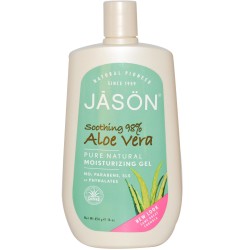Top Class Actions’s website and social media posts use affiliate links. If you make a purchase using such links, we may receive a commission, but it will not result in any additional charges to you. Please review our Affiliate Link Disclosure for more information.

The three judge panel said that the lower court should have stayed the all natural class action lawsuit while it waited for a response from the U.S. Food and Drug Administration (FDA).
“A product labeled ‘all natural’ or ‘pure natural’ likely evokes images of ground herbs and earth extracts rather than chemicals such as ‘Polysorbate 20’ or ‘Hydroxycitronellal,'” wrote U.S. Circuit Judge M. Margaret McKeown in the opinion on behalf other judges, which includes Chief U.S. Circuit Judge Sidney R. Thomas and U.S. Circuit Judge A. Wallace Tashima.
However, Judge McKeown writes that while “the underlying question of what constitutes a ‘natural’ cosmetic poses a fascinating question, it is not the one we answer.”
The appeal is over “whether federal preemption or the primary jurisdiction doctrine prevents the district court from deciding when a ‘natural’ label on cosmetic products in false or misleading,” the appellate judge explains.
“We conclude that the [federal] Food, Drug, and Cosmetic Act [FDCA] does not expressly preempt California’s state law causes of action that create consumer remedies for false or misleading cosmetic labels,” writes Judge McKeown.
She says that the lower court did invoke “the primary jurisdiction doctrine” properly, but that “it erred by dismissing the case rather than issuing a stay pending potential agency action by the Food and Drug Administration.”
The primary jurisdiction doctrine works by allowing a court to defer to the applicable agency, in this case the FDA, that may have special knowledge on the issue, in this case cosmetic products.
Judge McKeown explains that by dismissing the class action lawsuit it could create prejudice against the plaintiffs.
“Indeed, this case demonstrates the mischief that can arise when a district court dismisses claims rather than staying them while awaiting agency action,” she says. “Rather than seeking guidance from the FDA, Hain attempted to leverage the district court’s dismissal on primary jurisdiction into an outright dismissal of some of Astiana’s claims by arguing that she had forfeited her right to request a stay in proceedings.
“Enabling such ‘gotcha’ litigation tactics is not the purpose of the primary jurisdiction doctrine,” Judge McKeown contends.
“Because the Ninth Circuit ‘has not clearly adopted the doctrine of equitable tolling in primary jurisdiction cases,’ prudence dictates that a court should stay proceedings rather than dismissing them when there is a ‘possibility’ that the running of the statute of limitations during administrative proceedings could affect the parties’ rights,” the panel says.
For this reason the appellate court says that by “dismissing the case rather than staying it, the court did not consider whether the parties would be ‘unfairly disadvantaged.’
McKeown explains in the decision that “the purpose of referral to the FDA was not for the agency to adjudicate Astiana’s claims, but to provide expert advice that would be useful to the court in considering this lawsuit.
“In light of these considerations, we reverse the dismissal on primary jurisdiction grounds,” she writes.
When the all natural class action lawsuit is sent back to the district court, it “may consider whether events during the pendency of this appeal—including Astiana’s informal letter, the FDA’s website publication of a Small Business Fact Sheet regarding cosmetics labeling, and the FDA’s response to the other courts—affect the need for further proceedings at the FDA or demonstrate that another referral to the agency would be futile.”
The Ninth Circuit also reversed the dismissal of the plaintiffs quasi-contract claims but agreed with the lower court in dismissing allegations of unjust enrichment.
This JASON Natural Products class action lawsuit was filed by plaintiffs Skye Astiana, Tamar Davis Larsen and Mary Littlehale, alleging that the “all natural” claims on the JASON product labels deceived them into purchasing the products made by Hain, when they actually contain synthetic ingredients “ranging from benzyl alcohol to airplane anti-freeze.”
They have charged Hain with violating the Magnuson-Moss Warranty Act, California’s unfair competition and false advertising laws, common law theories of fraud and quasi-contract.
The lower federal court ended up dismissing the all natural class action lawsuit based on the FDCA “so the parties could seek expert guidance from the FDA.”
Hain says that the FDCA preempts the claims made by the plaintiffs based on California state law. Hain wanted the appellate court to offer a ruling on this assertion.
A similar class action filed against Hain over the alleged misuse of the word organic on its JASON and Avalon product labels received class certification in a California federal court in November 2014.
The plaintiffs are represented by Michael David Braun of Braun Law Group PC, Joseph Nicholas Kravec Jr. and Wyatt A. Lison of Feinstein Doyle Payne & Kravec LLC and Janet Lindner Spielberg of Law Offices of Janet Lindner Spielberg.
Hain Celestial is represented by James M. Schurz and Lisa A. Wongchenko of Morrison & Foerster LLP.
The JASON Natural Products Class Action Lawsuit is Skye Astiana et al. v. Hain Celestial Group et al., Case No. 12-17596, in the U.S. Court of Appeals for the Ninth Circuit.
ATTORNEY ADVERTISING
Top Class Actions is a Proud Member of the American Bar Association
LEGAL INFORMATION IS NOT LEGAL ADVICE
Top Class Actions Legal Statement
©2008 – 2024 Top Class Actions® LLC
Various Trademarks held by their respective owners
This website is not intended for viewing or usage by European Union citizens.














